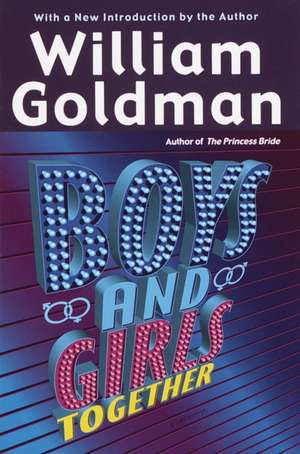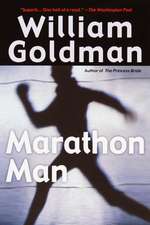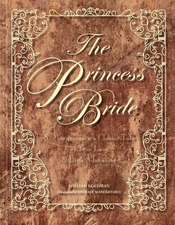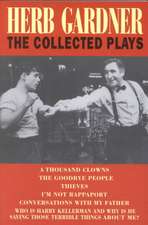Boys and Girls Together
Autor William Goldmanen Limba Engleză Paperback – 30 iun 2001
BOYS & GIRLS TOGETHER
Aaron, Walt, Jenny, Branch, and Rudy. They are children of America's post-war generation, as different from one another as anyone can be. Yet they are bound together by the traumas of their pasts, the desperate desire to capture their dreams and satisfy their passions, the stirring pleasures of sexual awakening--and the twists of fate that will inextricably link their lives in the turbulent world of 1960s New York City.
Preț: 208.13 lei
Nou
Puncte Express: 312
Preț estimativ în valută:
39.83€ • 42.59$ • 33.21£
39.83€ • 42.59$ • 33.21£
Carte tipărită la comandă
Livrare economică 17 aprilie-01 mai
Preluare comenzi: 021 569.72.76
Specificații
ISBN-13: 9780345439734
ISBN-10: 0345439732
Pagini: 768
Dimensiuni: 140 x 216 x 48 mm
Greutate: 0.95 kg
Ediția:Ballantine Book.
Editura: BALLANTINE BOOKS
ISBN-10: 0345439732
Pagini: 768
Dimensiuni: 140 x 216 x 48 mm
Greutate: 0.95 kg
Ediția:Ballantine Book.
Editura: BALLANTINE BOOKS
Recenzii
"A SUPERB, BRILLIANT EVOCATION . . . Satisfying in its length, rich in its complication, intriguing in its characters, and above all, revealing of its time and place."
--Los Angeles Times
"[GOLDMAN] SUCCEEDS WHERE MOST NOVELISTS SINCE THOMAS WOLFE HAVE FAILED. He carves a huge piece out of the heart of New York, and it has life, power, beauty and truth."
--San Francisco Chronicle
--Los Angeles Times
"[GOLDMAN] SUCCEEDS WHERE MOST NOVELISTS SINCE THOMAS WOLFE HAVE FAILED. He carves a huge piece out of the heart of New York, and it has life, power, beauty and truth."
--San Francisco Chronicle
Extras
Aaron would not come out.
Nestled inside his mother, blind and wrinkled and warm, he defied the doctors. Charlotte's screams skimmed along the hospital corridors, but Aaron, lodged at his peculiar angle, was mindless of them. Charlotte vomited and shrieked and wanted to die. As that possibility became less and less remote, the doctors hurriedly decided to operate and, deftly cutting through the wall of Charlotte's abdomen, they slit the uterus and reached inside.
Pink and white like a candy stick, Aaron entered the world.
It seemed to be a great place to visit. His father could not have been gladder to see him. Henry Firestone, universally known as Hank, was a big man, confident, with a quick smile and a loud, rough voice. Aaron never forgot that voice; years later he would still spin suddenly around—on the street, in a restaurant, a theater lobby—whenever he heard a voice remotely similar.
Hank was a lawyer, for Simmons and Sloane, the Wall Street firm, and when he was thirty-one Mr. Sloane himself made Hank a full partner, Mr. Simmons being bed-ridden that day with gout, a disease to which he noisily succumbed some months later. The week he became a partner, Hank was sent to Roanoke, Virginia, for a three-day business trip.
He stayed two weeks and came back married.
Her name was Charlotte Crowell, of the Roanoke Crowells, or what once had been the Roanoke Crowells, the family having been comfortably poor since shortly before the turn of the century. Charlotte was tiny, barely five feet tall, with a sweet face and a voice as soft as her husband's was harsh. Her hair was black and she wore it long and straight, down her back; even when it began turning cruelly white (she was not yet thirty) she wore it that way.
Hank and Charlotte lived in New York for a few months but then, the summer after they were married, they moved to a large white colonial on Library Place, a gently curving tree-lined street in the best section of Princeton, New Jersey. Mr. Sloane himself lived in Princeton, on Battle Road, of course, and when he saw that the house on Library Place was up for sale he mentioned it casually to Hank, who immediately took Charlotte for a look-see. Charlotte loved it—it reminded her so of Roanoke—so Hank bought it for her. He couldn't afford it but he bought it anyway, partially because Charlotte loved it and partially because she was pregnant and everybody told them New York was no place to bring up children. They moved into the house the week after Deborah was born, all waxy and red, the only time she was ever unattractive. The wax soon washed away, the red softened into pink, and she became a beautiful baby, fat, spoiled and sassy. Charlotte adored her and Hank liked her well enough—he cooed at her and carried her around on his big shoulders and gently poked her soft flesh till she giggled—Hank liked her fine, but he was waiting for his son.
The wait took over two years. Hank worked hard at the office, making more money than he ever had before in spite of the depression, and Charlotte hired a full-time maid and then a gardener to tend the lawn on summer mornings. They entertained a good deal and they entertained well; Charlotte had the gift. Hank gave up tennis for golf, which bored him, but it was better for business. A lot of things bored Hank until the evening Aaron emerged.
Before the boy was a month old his room was crammed with toys and dolls and music boxes, and a menagerie of stuffed animals pyramided against the foot of his canopied bed. Almost every afternoon Hank journeyed north to F. A. O. Schwarz's for more and more presents, and when Charlotte warned he was in danger of buying out the store he only nodded happily and told her she had guessed exactly his last remaining ambition. Nights Hank spent in the boy's room, rocking him to sleep, singing soft lullabies in his big rough voice. Whenever the boy was sick—and he was sick a good deal—Hank would go to work late and return early, calling in constantly from New York, always asking the same question: "Aaron? How is Aaron? How is my son?"
Hank loved Aaron; Charlotte loved Deborah. There were no troubles on Library Place.
For Aaron's third birthday Hank bought him a jungle gym. They set it up together, the two of them, in the back yard. It was a marvelous structure, more than six feet high, and Hank used to take Aaron and lift him, setting him on the very top rung. "Hold tight now," Hank would say. "Hold tight and stay up there all by yourself." So Aaron would hold tight, sitting on the top rung, his tiny fists gripping the bars for balance. Hank would back away from him then, calling out "Scared?" and Aaron would yell "No, no," even though he was.
One Saturday afternoon the maid was out and Charlotte was watching Deborah perform at ballet class, so Hank and Aaron played cops and robbers for a while, shooting each other, falling, suddenly up again, running pell-mell across the lawn. After that it was time to play on the jungle gym. Hank lifted Aaron, carried him on his big shoulders, carefully placed him on the very top rung. Hank started backing away. "Hold tight now," he said. Aaron held tight. "Are you scared?" he said. "No," Aaron cried; "no." Hank stood a distance from the jungle gym and smiled his quick smile. Then, thoughtlessly, he paled, falling to his knees. He gasped for a moment, then slipped to the grass. Gasping louder, he crawled forward, crawled toward the jungle gym, saying, "Aaron. Aaron." He raised one big arm, then dropped it. Reaching for his son, he died, sprawled full length, white on the green lawn.
Aaron giggled. "That was good, Daddy," he said. He did not know the name of the game, but whatever it was it was obviously still on—his father, after all, had not answered—so he giggled again and stared down at the dead man. It was a fine summer day, windy and warm, and Aaron stared up at the clouds a moment, watching them skid across the sky. Grabbing on to the bars with all his strength, he looked down again—it frightened him to look down, it was so far—but his father still had not moved. "That's good, Daddy," Aaron said. He giggled once more, lifting his head, staring at the clouds. His fists were beginning to get sore from holding the bars, but he did not dare loosen his grip. "Down, Daddy," Aaron said, looking up. "I wanna come down." The game was still on; his father did not move. Aaron gazed at the clouds and started to sing. "How sweet to be a cloud floating in the blue. It makes you very proud to be a little cloud." It was a song from Winnie the Pooh—Aaron knew all the songs from Winnie the Pooh—and Pooh sang it when he was floating up after the honey on the tail of the balloon. But he never got the honey because the bees found him out and Pooh fell all the way down. Pooh fell. Aaron's hands ached terribly. "Daddy," he said louder. "Take me down, Daddy. Please take me down."
His father made no move to do so.
"Daddy," Aaron said, frightened now. "I'll drink my milk I will I will I promise but take me down." He hated to cry—his father never cried—but suddenly he was crying, the tears stinging his eyes. "Take me down, Daddy." He began to shake and his hands were numb and the tears would not stop. "Take me down dah-dee." His chest burned and the clouds were monsters diving at him so he closed his eyes but he thought he might fall so he opened them, alternating his stare, up to the diving monsters, down to the still figure, up and down, up and down. Aaron began to scream. "Dah-dee dah-dee dah-dee take me down dah-dee take me down take me down dah-dee dah-dee dah-dee dah-dee take me down."
He was still screaming when Charlotte found him an hour later. She ran across the lawn, took him down. Then she dropped to her knees beside the still white figure on the grass.
Soon she was screaming too.
For a short period after the funeral there were no changes in the life at Library Place. Then one morning the gardener didn't come; a high-school boy was hired to mow the lawn. Two months later Charlotte let the maid go. There was no money coming in now, no money coming in. They had always lived beyond Hank's income and probably Charlotte should have given up the big house sooner, but she determined to keep it, working desperately, cutting corners, cleaning and patching and cooking until finally, eight months after the death, Charlotte, exhausted, found a new place to live, the first floor of a yellow frame house on Nassau Street, close to the center of town.
Deborah wept as her mother packed her clothes. "Now, Deborah Crowell Firestone, you stop that, hear?" Charlotte said in her soft Southern voice. Aaron stood silently in the doorway of Deborah's room, watching. "Oh, baby," Charlotte sighed, opening her arms. "You come to me." Deborah ran into her mother's arms. Charlotte rocked her gently, back and forth. "It's all right, baby, hear? Mother's going to make it all all right. Everything's going to be wonderful, baby. Mother promises. Mother loves you and she swears it's going to be all right. Mother loves—"
Aaron crept into the room.
"Get out," Deborah said.
Charlotte said, "Now, Deborah, you stop talking that way."
"Get out," Deborah repeated.
"Aaron is your brother. Aaron is my son. Aaron is a part of this family. Have you packed your games, Aaron?"
"No."
"Well, maybe you better pack your games, do you think?"
Aaron turned and said, "All right."
"And stay out," Deborah called after him.
The yellow frame house on Nassau Street was owned by Miss Alexandra Hamilton, an elderly lady who had been teaching high school in Princeton since before the First World War. Miss Hamilton had been married twice, both times to the same man, an irresistibly handsome plumber from Newark. He was still alive and plumbing, but after the second divorce Miss Hamilton resumed her maiden name. She met Charlotte and the children as they moved in, set down the law of the land—"There is to be no noise"—and promptly departed to the second floor via the outside stairway, which she always used. They heard her occasionally, going in and coming out, but they saw her only once a month, when she stopped by for the rent.
Shortly after Aaron was five, Charlotte went out and got a job. The money from the sale of the white colonial was going much too quickly, so one morning she combed her long black hair, put on her best white hat—from behind she looked like a school girl—and left the house "to seek her fortune," as she told her children, giggling nervously while she said it. When she returned to the house several hours later she reported that she had "acquired the enormously responsible position" of saleslady at the Browse-Around, an expensive shop on Nassau Street catering to girls and young women. From that day on she seemed forever to be talking about the Browse-Around, about style and color and cost and the women who brought their little girls in for clothing and how much they spent and "not one of 'em's as pretty as you, Deborah; not one holds a candle to you." A month after she had been at the store she brought home a playsuit for Deborah. It was marked down, she said, and, besides, she had her employee's discount, and a week after the playsuit came a dress, and then there followed other dresses, and pajamas and shoes and gloves and socks and blouses and coats and hats.
Aaron began to read.
All the time, lying on his bed, his thin arms holding the books upright on his stomach, his thin fingers turning the pages. He was tall and bony and long, and he ate only when forced. He had no interest in food. Charlotte forbade his reading at the table and at night she forced him to turn out his bed light and sleep. He would obey partially, lying still, waiting for her to go to bed. Then he would read into the night until his eyes burned.
One hot summer day when he was seven Aaron Firestone sat on his bicycle, staring hypnotically at the traffic on Nassau Street. The street was crowded; the cars seemed hardly to be moving at all. A truck lumbered noisily toward his house. The truck stopped, then started again, but slowly, slowly. Aaron pushed hard on the foot pedal and the bike left the sidewalk and skidded over the curb, down into the hot street. Aaron fell backward, balance gone. The truck braked, stopping, but not before its great wheels rolled up and over Aaron's legs.
He awoke in the hospital to find his mother leaning over him, weeping. Looking away from her tears, he muttered, "I'm sorry, Mama." Charlotte sobbed aloud, reaching for her son, cradling him. Hidden beneath the folds of Charlotte's dress, Aaron found himself smiling.
He was in the hospital over a month. Charlotte came to visit every day and sometimes Deborah came too, but mostly it was just his mother. Aaron got to like it in the hospital until Charlotte told him that his hips had been damaged, crushed somehow by the truck, and he would be able to walk again, not well, probably not without some pain, but he would be able to walk.
Aaron started practicing with crutches. Then canes. Finally he was able to move unaided. It hurt, a lot at first, and the pain never completely left him, especially when he was tired, but by the time they brought him home from the hospital he walked by himself.
It was a steaming afternoon, and Charlotte, first seeing that Aaron's needs were accounted for, excused herself and hurried to the Browse-Around. Deborah appeared briefly, wearing a new dress, and she modeled it for Aaron before going down the street to play. Aaron lay on his bed and tried to read. The room was very hot. His throat felt dry and there was a different dryness deep behind his eyes, and perspiration poured off his thin face.
Aaron shut his book and his eyes. He lay perfectly still until a fly buzzed near him. He lunged for it, missing, but managing by the sharpness of his movement to cause his hips to hurt. Aaron bit his lip until the pain was gone. Then, taking a deep breath, he moved slowly off the bed to the telephone. When he got the Browse-Around he asked for his mother, and when he got her he said, "Did you ask me to call you? I forgot."
"Aaron, whatever—"
"I couldn't remember if you asked me to call you at the store to tell you how I was or not, I'm fine."
"Good. Of course you are."
"I'm reading this book. It's a very thrilling adventure story."
"It's my son," Charlotte said.
"What?" Aaron said.
"I was just explaining who you were to Mrs. Cavanaugh, Aaron. Mrs. Cavanaugh is buying the cutest—"
"I loved Deborah's new dress."
"Oh, good. Aaron? Thank you for calling; I'm very glad you called—"
"Bye-bye, Mama," Aaron said, hanging up. He moved back to his bed and lay down. Then he got up and walked very slowly out of the room, out of the house. On the sidewalk, he paused for a moment to stare at the spot where the truck had hit him. Aaron turned and, forcing his legs to obey, began to limp along Nassau Street. He was sweating terribly and his legs hurt more and more with each slow step, but he dragged himself along.
Almost an hour later he reached the white house on Library Place. Aaron stopped. In the yard he saw three children playing, and their high laughter reached him on the thick summer air. He hated to cry—his father never cried—but suddenly he was crying, bitterly, painfully, out of control. Aaron dropped to the cement sidewalk and wept. When he was done, he vowed not to let it happen again.
His word was good for close to twenty years.
The days that followed proved easily endurable. He read books. Quickly at first, but by training himself he increased his natural speed until, by the time he was twelve, he could finish almost any book in a single day. He began to draw, his thin fingers fluttering hurriedly across white notebook paper, leaving behind an accurate image of a tree or a gun or an elegant car. He taught himself to play the piano even though he never had a lesson. Deborah got the lessons, one each week from a university student who didn't really need the money but who liked to look at Deborah for an hour each Tuesday; even at fourteen, Deborah was something to see. During the lessons Aaron would stand outside the living-room door, never making a sound—he was good at that; he would regularly frighten his mother by appearing suddenly in doorways or dark halls, making her spin around, making her gasp. And while the lesson went on inside, Aaron would listen, and when the university student said "Cup your hands, no, relax them, relax them," Aaron would cup and relax his hands. Then, when the student was gone, he would rush to the piano and practice. He had a good ear. Deborah had none, but the lessons continued for more than a year because Charlotte felt the playing of Chopin to be a minimum basic requirement for any young lady worthy of the name. By the end of the year, Aaron could play. So he played, and he read, and he drew.
But his greatest love was writing.
He had begun to write quite by accident. He had been to the movies alone one night and, as was his ritual, he crept silently into the house. When he heard his mother's voice he stopped.
"I'm worried about Aaron," Charlotte said.
Deborah grunted.
"What are we going to do about Aar—stop fiddling with your nails and help me, Deborah—he's your flesh-and-blood brother after all."
"That," Deborah said, "is not my fault."
"He should go out with other people more," Charlotte said.
Deborah laughed. "What other people? Aaron's a joke, Mother. I just dread having him in high school with me next year."
"People shouldn't laugh at Aaron," Charlotte said. "Why do they?"
"Look at him. He's ninety feet tall and his clothes never look like they fit and he thinks he's so smart and he's all the time appearing behind your back like a spook. He's a nut, Mother. I'm ashamed to be seen with him and that's the truth."
"If only your father had lived," Charlotte said. "If only he hadn't—"
Aaron slammed the front door.
"Is that you, Aaron?" Charlotte called.
"Yes, Mother," he answered.
"Howza flick?" Deborah asked him.
Aaron smiled. "Yummy."
That night he drew a vicious picture of his sister. He looked at it. It wasn't enough. He began to draw another picture, then, suddenly shifting from one form to another, he started writing. He wrote for hours. About Deborah. And Charlotte. Page after page, crushing them beneath the weight of his erudition, slashing the remains with his wit. It was nearly dawn when he finished. Aaron walked outside and waited for the sun. He felt wild.
He began writing character sketches of his fellow students, the shift into high school serving only to widen his choice of subject matter. He was protected from everyone now; as long as he had paper, he was safe. In school he was brilliant, and if his teachers were frightened of his habit of asking difficult questions, then smiling at them while they stumbled through an answer, they also admired his brilliance. His fellow students simply feared him. Sometimes, as he limped through the halls, he could hear them whispering about him. "That's Debby Firestone's brother. Him. Yeah. Can you believe it?" Whenever he met his sister on his way to class the pattern was always the same. She would do her best not to see him until he moved almost directly in front of her. Then she would smile. Aaron always smiled back.
He was a freshman in high school when he discovered his name. He was reading in study hall, doing his homework for the day, when he chanced across the names of the four elements: earth, air, fire and water. He studied the words. Earth, air, fire and water. Earth and air. Air and fire. He said them to himself. Air and fire. Aaron Fire. Aaron Fire. He shrieked. Heads turned to face him. Aaron Fire. That was his name. Aaron Fire the writer. He was Aaron Fire, the writer.
At last he knew his immortality was assured.
Charlotte decided the time had come for Deborah to get married. Deborah was eighteen, halfway through her senior year in high school, and there seemed little point in her going to college. Her grades in high school had been barely average, and, more than that, what was the point of going to college when there were all the eligible young men right here in town, in Princeton. "And you must have an eligible man, my baby," Charlotte said. "It has got to be an eligible man."
"You mean rich," Deborah answered.
Charlotte grabbed her daughter's shoulders and turned her. They faced each other, standing close. "Now you hear me," she whispered. "You listen to your mother. I want you to marry for love, you understand that? For love." Charlotte smiled. "But you might as well fall in love with a rich man."
And so the search for a suitor began. Not that there was any shortage of candidates; Deborah was pretty, with pale red hair and a lithe body, and boys flocked to the yellow house on Nassau Street. High-school boys and Princeton sophomores and even a few graduate students all the way from Columbia University. But the rich ones were too young and those old enough didn't quite seem eligible enough.
Aaron watched it all, watched as his mother entertained the men in the living room while Deborah applied a final touch of lipstick, a last dab of perfume. Charlotte was at her most charming—she seemed to speak more Southern than in the past—as she gently probed the young men, inquiring as to their homes, their interests, their parents' occupations. "Mr. Firestone was a fine lawyer," she would begin. "Is your father by any chance in law?" Occasionally she would bring Aaron into use, calling to him as he stood by the wall outside the living room. "Oh, come in, Aaron. Do you know my son Aaron? Aaron's the smart one in the family." But always, after Deborah and her escort had gone, Charlotte would frown slightly, shaking her head. "Not for my baby," she would mutter. "Not good enough for my baby."
Generally her disapproval went only that far—a quick shake of the head. The one time it exceeded the limit was when Deborah went out with Dominic Melchiorre. He was a big man, broad and swarthy, and he came to the door wearing a striped double-breasted suit. Ill at ease, he stumbled through a few minutes' conversation with Charlotte. Then he smiled at Charlotte—he had a dazzling smile, white teeth flashing against dark skin—and moved outside. "Tell Debby I'm in the car," Dominic Melchiorre said. Charlotte watched him through the screen door as he got into an old sedan and began smoking. Deborah dashed after him a few minutes later. "Bye, Mama," she said. "Don't wait up."
But Charlotte waited.
Aaron listened to the scene from his room. Deborah got home after three and Charlotte was ready. "An Italian?" she began. "I brought my daughter up so she could be escorted by an Italian? I bought my daughter clothes so she could look nice for a . . . a . . ."
"Say it," Deborah urged.
"Catholic," Charlotte said.
"I like him."
"You like him. Oh, baby, you don't know what you're saying. What does he do?"
"He's in the construction business."
"Day laborer, you mean. A common sweating day laborer."
"But I like him."
"There's nothing to like! He does not exist. This did not happen. Not in our world. He is gone, hear? He is dead and forgotten and long, long gone. You tell me that. Deborah Crowell Firestone, you just tell me!"
There was a long quiet.
"Gone," Deborah whispered then. "He's gone."
They wept that night. Both of them. When they retired to their bedrooms, Aaron could hear them weeping.
Aaron smiled.
Jamie Wakefield appeared the following week, as if divinely ordered. Charlotte met him first, at the Browse-Around. "This wonderful young man came in today," she began, the minute she got home. "Listen to me, Deborah, while I tell you about him."
"Who?" Deborah took her gum out of her mouth and began rolling it in her fingers.
"Jamie Wakefield, that's what I'm trying to tell you. Jamie Wakefield, he bought a coat—Deborah, stop playing with your gum this min- ute, hear?—a cashmere coat. For his mother. It's her birthday and he bought her a one-hundred-percent cashmere coat just like that. We got to talking, and he is a real charmer and nice-looking and—"
"I'll bet," Deborah said.
"And it turns out he's from Dallas. Well, I had his address, of course—he was sending the coat to his home—and you remember my cousin Millie—well, she lives in Dallas, has all her life, and she told me today—"
"You called her?" Deborah said. "To check up on this boy?"
"I did no such thing as check up on anybody. I owed Cousin Millie a letter—have for the longest time—so I called her to chat and if I happened to mention the Wakefield boy, well, I certainly don't see anything unusual in that. Deborah, you're going to love this Jamie Wakefield—I know it. I told him all about you—he's very interested—he's a pre- medical student and I mentioned how you loved biology and all. He's coming on Friday to see you. I knew you'd be free, so I took it on myself—"
"I'm busy Friday," Deborah began.
"Not anymore you're not," Charlotte said. "Not after what Cousin Millie told me today you're not."
"What did she say?"
"He's eligible, baby. That's what she said."
Jamie Wakefield arrived promptly at seven o'clock on Friday, wearing a dark tweed coat, a dark tweed jacket and dark gray pants. Shy, obviously nervous, he waited with Charlotte and Aaron in the living room.
"I think the role of a physician is a noble one, Mr. Wakefield," Charlotte said. "My husband, Mr. Firestone, was a lawyer. That's noble too."
"Yes, ma'm," Jamie Wakefield said. He was of medium height, with brown hair and a bland, even face.
"My son Aaron here hasn't decided yet what he wants to be, have you, Aaron?"
"Not yet," Aaron lied. He had never told her about Aaron Fire. There was no point in telling; she would never have understood.
"Aaron's the brains of our little family," Charlotte went on. "Deborah's got the beauty and Aaron's got the brains." She laughed softly. "I don't know where I fit in."
"I'm sure they both take after you, Mrs. Firestone," Jamie Wakefield said.
"Gallantry," Charlotte said. "Undeniable gallantry. See, Aaron? It's true what I say about Southern men. They have—what would you call it, Mr. Wakefield?"
"I don't know, ma'm."
"Flair," Charlotte said. "That's as good a word as any. Style. Southern men have style."
"If you say so, ma'm." Jamie Wakefield nodded.
"Why, I remember some of my beaus when I was growing up in Roanoke. I remember . . ."
Fortunately, Deborah appeared.
Jamie Wakefield stood silently, looking at her. She was wearing a dark green dress and it contrasted perfectly with her pale red hair. "Mr. Wakefield, my daughter Deborah," Charlotte began. "Deborah, this is Jamie Wakefield from Dallas."
"How do you do, Mr. Wakefield," Deborah said.
"Yes, ma'm." Jamie nodded, looking at her.
Charlotte saw them to the door, and when they were gone she whirled around, eyes bright, arms stretched wide. "Aaron," she said, "we have great expectations."
For the next month Deborah and Jamie dated several times a week and every weekend. Jamie was inexperienced, backward at times, ill at ease. He took her to the movies and for coffee after, where she did most of the talking, chattering on about whatever came into her mind, while he simply nodded, sipping his coffee and nodding, looking at her. Then they began going to New York. They ate sometimes at Le Pavillon—Jamie's father liked Le Pavillon—and they went to the theater on Saturday nights, and everything seemed to be living up to Charlotte's hopes until Deborah found out she was pregnant.
Charlotte's reaction to the news was quite remarkable. They were having dinner, Deborah and Charlotte and Aaron, sitting at the small table in the corner of the kitchen, and Charlotte was commenting about how happy she was and how happy Deborah was and how even Aaron seemed happier than usual and wasn't it wonderful what one person like Jamie Wakefield could do for the spirits of one family and the high cost of weddings and was there ever a better time of day than suppertime with a family all together when Deborah burst uncontrollably into one quick wave of tears and then gave forth the news. In the ensuing silence, Deborah half closed her eyes, tilting her face up toward her mother, ready for the blow.
Charlotte simply put her fork down. "You're sure?"
Deborah nodded.
"Jamie?"
Deborah shook her head.
"Who, then?"
Deborah sat frozen.
"Tell me—" Abruptly Charlotte stopped and said "No."
Deborah nodded yes.
"The Catholic, I might have known," Charlotte said, and she put the tips of her fingers against her closed eyes, talking very quietly. "It is not going to happen and that is all there is to it. I simply will not allow . . ." She opened her eyes. "Are you sure it isn't Jamie?"
Deborah nodded.
"How do you know?" Charlotte asked, no longer talking quietly.
"Jamie's never touched me," Deborah whispered.
Charlotte reached across the table and took her daughter's hand, stared at her daughter's eyes. "We can remedy that, can't we, baby?" Deborah said nothing. "Can't we, baby? Can't we, baby?" Staring and touching, Charlotte went on. "Can't we, baby? Can't we, baby? Can't we, baby?"
Deborah was never one to argue with her mother.
When Jamie arrived that night Deborah was waiting for him, sitting in the living room. "Where's your mother?" Jamie asked. "It doesn't seem as if I deserve to see you without talking with your mother a while first. Sort of a price of admission."
"Mother had to go to New York for the evening. Some cousin of hers is in town."
"Well, I'll miss her," Jamie said. "I'll truly miss her." He took off his tweed coat and folded it over a chair. "You look very pretty, Deborah."
She smiled at him. "You always say that."
"It's the truth is why."
Deborah wore a black sweater open at the throat with a thin strand of pearls around her neck. "Hey," she said, giggling. "Guess what I discovered today. Guess. Mother keeps a bottle. Isn't that amazing? Do you want a drink?"
"No," Jamie said.
"True blue Jamie Wakefield," Deborah answered. "Lips that touch liquor will never touch his. I'm going to have a drink. A big strong one."
She disappeared into the kitchen and Jamie could hear the sound of an ice tray splitting open. He rubbed his palms against his trousers. Deborah came back carrying two glasses. "I brought you one anyway. In case you change your mind." She handed it to him and they both sipped in silence for a while.
"Aaron's at the movies," Deborah said. "Like always, Aaron's at the movies."
Jamie nodded.
They sipped a while longer.
"The lights bother my eyes," Deborah said. "Jamie, turn off the lights."
"What's got into you anyway? 'Jamie, turn off the lights.' "
Deborah giggled. "I'm just trying to get you alone in the dark, silly. That's all."
Jamie looked at her. "You are?"
"I are."
"Oh." Slowly he walked to the wall switch and flicked it off. The room was dark momentarily, but then they began getting accustomed to the moonlight. Jamie sat across the room from her, holding tightly to his glass.
"Jamie Wakefield, you win the blue ribbon for stupidity. The world's championship."
"What did I do?"
"Why are you sitting over there? What's the point of being all alone in the house with no lights anywhere to be seen if you're going to sit a million miles away?"
"You want me to come sit beside you?"
"No. Move farther away if possible."
He moved through the darkness and sat beside her. "Here I am," he said, taking a long drink of bourbon.
Deborah began to laugh. "It's just like kindeegarden. I swear it is." She laughed louder. "You might as well turn the lights back on. Never mind. I'll do it."
She made as if to move, but he took her hand. "No."
"Well, why not?"
Her pearls glistened in the moonlight.
"Why not?"
Jamie put his drink down. His hands were trembling terribly.
"Why not?"
Jamie grabbed her. He dug his fingers into her shoulders and her face turned, moving up to meet his.
"Jamie," Deborah said. "Jamie."
He kissed her again and she pressed her body against his body, her arms locking around his neck. Her tongue flicked at his mouth while his hands pressed against her flat stomach. Slowly, hesitantly, his hands began moving higher until they were cupped around her breasts. "Yes," Deborah said. Jamie began unbuttoning her sweater.
Aaron saw it all.
Standing in the darkness of the foyer, he saw it from the first rough kiss. There were times when it was hard to keep from laughing at what they said, at Deborah's pseudo passion, Jamie's overpowering sincerity. But he did not laugh. He watched instead as they disrobed, throwing their clothes to the floor, lying on the couch in the moonlight. Deborah still wore her pearls and Jamie had his socks on, but Aaron did not laugh. He moved closer as their bodies locked, Jamie astride her, Deborah moaning wonderfully beneath him.
When they were done Aaron left, slipping out of the house. Alone on the sidewalk, he began to howl.
They waited three weeks before Deborah made the phone call. Three weeks seemed suddenly an incredible length of time. Charlotte would stare at Deborah's stomach in the mornings, then quickly look away. But finally the time came and Deborah made the call.
"Jamie?" she said. She was crying softly; the tears were real.
"Yes?"
"Jamie—"
"What? What is it? Tell me."
Deborah told him.
"Are you positive? It can't be. It's too soon."
"I'm positive" was all Deborah said.
Jamie said nothing for a while.
"Come see me," Deborah managed, crying harder now. "Come see me tonight, Jamie Wakefield. I'll be waiting."
"I'll be there."
He found the note as he came back to his room after class. A folded piece of paper, it had been slipped under his door. Jamie stooped, picked it up. Then he read it.
she lies
she lies
it isn't your baby
it isn't your baby
They waited for him on the front porch of the yellow frame house, Charlotte and Deborah and Aaron. It was a warm night. Deborah sat very still. Aaron paced. Charlotte could not stop talking. "Now don't you worry, baby. Just as soon as he gets here we'll go inside—won't we, Aaron?—the minute he arrives you know we'll just disappear—you understand, Aaron?"
"Yes, Mother," Aaron said.
Charlotte turned to Deborah. "What time did he say he'd come?"
"Seven. He always comes then."
"Lots of time, baby."
Aaron paced faster.
"Aaron, you're making me nervous," Charlotte said.
"Terribly sorry, Mother." Aaron sat.
"Lots of time," Charlotte said.
"Maybe he won't come," Aaron said.
"Hush," Charlotte told him.
"Well, maybe he won't. Maybe he knows."
Charlotte snapped, "Impossible."
"I guess you're right, Mother." Aaron's fingers squeezed the arms of the rocking chair.
"Lots of time," Charlotte said at seven o'clock. She said it again at a quarter after and again at half past. "Lots of time. Lots of time."
Aaron waited with them. He could not remember having been so wildly happy. He had never known until then how splendid was his hatred, and the strength of it surprised him, almost frightened him a little. Taste it, he thought. Go on. His sister stared straight into the quiet night. His mother turned constantly, gazing down Nassau Street for the boy, the expression on her face growing more and more desperate as the hours went by. Aaron's body flamed. Giddy, he waited, exultant; he watched, enraptured, triumphant, revenged. Taste it. Go on. Go on. Taste it, bitch. Taste it, whore. Taste the wrath of Aaron Fire!
Descriere
Finally back in print, this is the classic, groundbreaking novel of a generations' coming of age by the bestselling author of "The Princess Bride".








